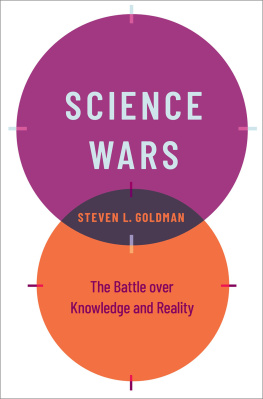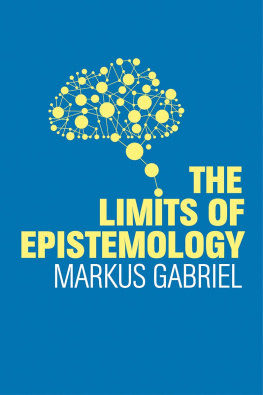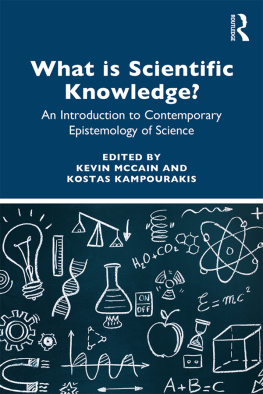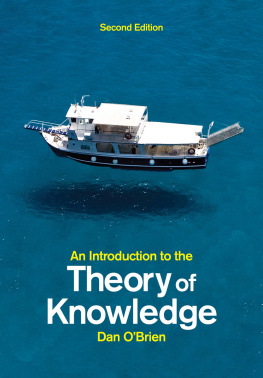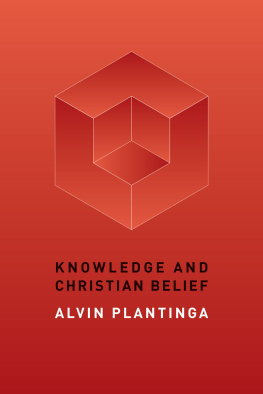
Goldman, Alvin I. Regents Professor of Philosophy, University of Arizona
Pathways to Knowledge
Private and Public
Publication date 2002 (this edition)
Print ISBN-10: 0-19-513879-1
Print ISBN-13: 978-0-19-513879-5
doi:10.1093/0195138791.001.0001
Abstract: Explores issues ranging from introspection to social epistemology. Internalism Exposed pinpoints problems in the defense of internalism as an approach to epistemic justification. A Priori Warrant and Naturalistic Epistemology argues that naturalistic epistemology is compatible with a priori warrant, and shows how scientific research supports an innate faculty of number cognition that can generate arithmetic belief with a priori warrant. The Unity of the Epistemic Virtues examines the prospects for a unifying account of distinct epistemic values, such as justified belief and true belief. The next three papers consider intuitions and introspection from an epistemological perspective. One paper explains how intuitions can play the evidential role that philosophical practice assigns to it. Two papers argue that introspection plays an unavoidable but legitimate role in the science of consciousness despite being a private method. The final three papers deal with aspects of social epistemology. One asks how novices can justifiably choose among two or more competing experts. Another explores the possibility of an epidemiology of knowledge, of which memetics is a prominent example. The final paper provides a critical survey and guide to the diverse approaches to social epistemology.
Keywords: a priori,consciousness,epistemology,experts,externalism,Alvin Goldman,internalism,introspection,intuitions,justification,knowledge,memetics,philosophy,social epistemology
Pathways to Knowledge
end p.i
end p.ii
Pathways to Knowledge
Private and Public
2002
end p.iii

198 Madison Avenue, New York, New York 10016
Oxford University Press is a department of the University of Oxford
It furthers the University's objective of excellence in research, scholarship,
and education by publishing worldwide in
Oxford New York
Auckland Bangkok Buenos Aires Cape Town Chennai
Dar es Salaam Delhi Hong Kong Istanbul Karachi Kolkata
Kuala Lumpur Madrid Melbourne Mexico City Mumbai Nairobi
So Paulo Shanghai Taipei Tokyo Toronto
Oxford is a registered trade mark of Oxford University Press
in the UK and in certain other countries
Copyright 2002 by Alvin I. Goldman
The moral rights of the authors have been asserted
Database right Oxford University Press (maker)
All rights reserved. No part of this publication may be reproduced,
stored in a retrieval system, or transmitted, in any form or by any means,
without the prior permission in writing of Oxford University Press,
or as expressly permitted by law, or under terms agreed with the appropriate
reprographcs rights organization. Enquiries concerning reproduction
outside the scope of the above should be sent to the Rights Department,
Oxford University Press, at the address above
You must not circulate this book in any other binding or cover
and you must impose this same condition on any acquirer
Library of Congress Cataloging-in-Publication Data
Goldman, Alvin I., 1938
Pathways to knowledge : private and public / Alvin I. Goldman.
p. cm.
ISBN 0-19-513879-1
1. Justification (Theory of knowledge) 2. Knowledge, Sociology of. 3. Consciousness.
I. Title.
BD212 .G65 2002
121dc21 2001046411
end p.iv
For Bill Alston
Valued friend and fellow traveler
down the pathways of epistemology
end p.v
end p.vi
Preface
From its beginnings epistemology has been concerned with two questions about knowledge: "What is it?" and "How do you get it?" Plato's answer to the first was that knowledge is true belief that is securely "tied down." His answer to the second was that knowledge is attainable by intellectual apprehension of the Forms. Subsequent epistemology centered more on the second question than the first, often quarreling over the feasibility, legitimacy, or reliability of proposed methods for gaining knowledge. Plato's theory of intellectual apprehension is a good example of a controversial method. The organizing theme of this collection of essays similarly centers around candidate methods, or "pathways," to knowledge. What are the available pathways, and which are the best ones, or acceptable ones, to follow? The question is not restricted, however, to knowledge. A close cousin of knowledge is warranted or justified belief, and many epistemologists are as interested in identifying proper pathways to justified belief as good pathways to knowledge. That question gets at least equal attention in this volume.
On the current epistemological scene the hottest debate about justification is the internalism/externalism debate. Chapter examines the most popular defense of internalism and finds it wanting.
end p.vii
Chapter defends the a priori from the standpoint of moderate naturalism. It rejects the traditional characteristics of the a priori just listed, but finds it plausible that there are psychological routes to mathematical belief and logical inference that are sound and distinctive enough to license a separate subcategory of warrant. Tentative support for this contention comes from empirical research in cognitive science, the sort of work needed to identify the exact nature of these "pathways." Reliable processes for arithmetic and logical cognition may be part of our natural endowment.
Chapter argues that a pretty good case can be made for epistemic unitarianism.
Parts II and III (chapters , written with Joel Pust, tries to tackle the problem. Instead of urging the abandonment of intuition as a dubious source of evidence, it tries to show how to interpret philosophical theories as theories about which intuition, properly construed, can provide legitimate evidence.
Chapters explore the legitimacy of another controversial pathway to knowledge: introspection. In the heyday of behaviorism and positivism,
end p.viii
introspection was often regarded as the prototype of a private process or method that should be forsworn, at least for scientific purposes. It fails to satisfy the requirement that scientific knowledgeand perhaps all knowledgeshould be based on public (intersubjective) data and public methods. Psychologists and philosophers of science are still queasy at the very mention of the word "introspection"; and many philosophers of mind, working in the long shadows of Wittgenstein and Ryle, favor functionalist accounts of mental states that try to avoid or minimize the role of "privileged access." There are two problems with the foregoing stricture against introspection. First, something like it (perhaps "internal monitoring") seems to be the way people normally determine their own conscious states. Second, the scientific study of consciousness currently enjoys not only renewed respectability but dramatically increased importance. The question then arises of how the scientific study of consciousness can proceed, or how its epistemology can be reconstructed. Does it relyperhaps implicitly and indirectlyon introspective methods, or can it do entirely without them? If it does rely on introspection, is the use of such a private method legitimate? Chapters explore this fundamental epistemological problem for the science of consciousness. I argue, first, that introspection is indeed required in the science of consciousness, because researchers must rely on the introspective reports of their subjects, and this reliance is in turn (tacitly) based on introspection of their own. Furthermore, introspection is indeed a private method, in a relevant sense of "private." Nonetheless, a private method can be a legitimate pathway to knowledge. The constraint of publicity, as a universal constraint on (scientific) method, should be rejected.




